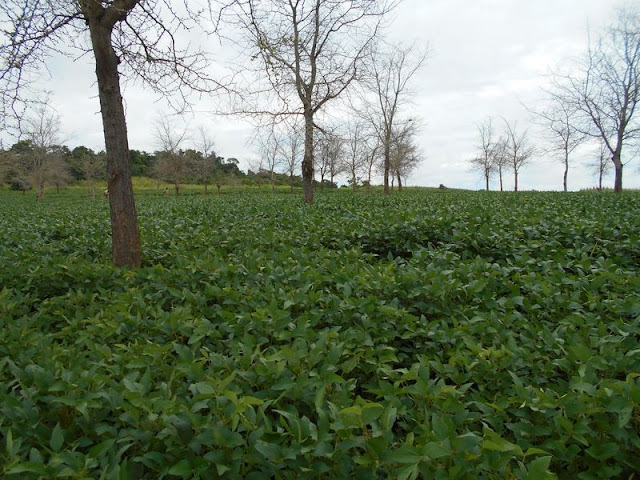Extension staff receive motorcycles
THE economy of Eastern Province is largely dependent on agriculture and agribusiness.
The agricultural sector employs nearly 85 percent of the region's workforce.
Those employed mostly work in the subsistence farming sub-sector.
The major crops grown in the region include maize, groundnuts, burley tobacco, cotton, sunflower and soybeans.
However, the potential that the province has in food production has not yet been fully exploited largely because the majority of producers still use traditional approaches in crop production which impact negatively on overall production and productivity.
In view of this, the Government continues to strengthen agricultural extension services as a major agricultural transformation strategy.
This is premised on the understanding that a strong extension service system is critical in introducing farmers to knowledge, information, and technologies that can improve their productivity, incomes, and well-being.
According to the Second National Agricultural Policy, one of the ways in which the Zambian Government would ensure efficiency and effectiveness of the extension service system would be through purchase of motorcycles for existing extension staff so as to ease their mobility challenges especially in rural areas.
These efforts, meant to ensure effective delivery of extension services, are supplemented by cooperating partners.
The Zambia Integrated Forest Landscape Project (ZIFLP) is one such venture.
This World Bank supported project being piloted in the Eastern Province from 2017 to 2022, is coordinated by the Ministry of National Development Planning and implemented by selected Government departments.
The project’s overall goal is to provide support to rural communities in Eastern Province in order to allow them better manage resources of their landscapes so as to reduce deforestation and unsustainable agriculture, enhance benefits they receive from forestry, agriculture, and wildlife, as well as reduce their vulnerability to climate change.
The project has recently invested in the provision of transport for its implementing agencies by way of procuring motor vehicles and motorcycles for provincial Government departments and agricultural extension staff respectively.
This is in an effort to ease mobility challenges of implementers as well as realisation of project outputs.
Speaking during the handover ceremony of 6 project vehicles and 62 motorcycles, Eastern Province minister Makebi Zulu said improving the transport system for Government departments and the extension staff of the Ministry of Agriculture would go a long way in improving the delivery of climate resilient extension services to the farming community.
He said it would also increase production and productivity.
Mr Zulu said transport was critical and indispensable for any project that involved accessing remote places in the region.
Those that received a vehicle each included the provincial Forestry Office, Department of National Parks and Wildlife, Department of Physical Planning, Provincial Planning unit, and provincial Project Implementation Unit.
The Provincial Agricultural coordinator’s office received one vehicle and 62 motorcycles.
“To ensure effective and efficient implementation of project activities, ZIFLP in 2019 procured 16 vehicles of which 9 were handed over to the districts in the province. This year 2020, ZIFLP has procured an additional 6 vehicles and 62 motorbikes which will be used by provincial Government departments and agricultural extension officers that are directly involved in the implementation of the project,” Mr Zulu said.
The Eastern Province minister implored the recipients of the vehicles and motorcycles to utilize them for their intended purpose.
“The prudent utilization of the vehicles will contribute to the ZIFLP outcomes which include; improved landscape management, increased environmental and economic benefits for livelihoods of rural communities, and mitigation of the negative impact of climate change,” he said.
The decision to procure vehicles and motorcycles has elated ZIFLP implementing agencies.
The Senior Agricultural Specialist – Land Husbandry Joseph Cheelo said the motorcycles received would lessen the transport problems that camp extension officers and block officers encounter in their quest to deliver extension messages to the farming community in the region.
“I am very sure that with this transport that we have received, the province is going to increase its production and productivity by use of climate smart agricultural technologies that are being promoted under the project,” he said.
Erastus Kancheya, the Department of National Parks and Wildlife Area Warden said provision of transport would ease supervision of activities under ZIFLP, while representatives of the Forestry Department commended Government for the gesture.
“Under this project, the Department of Wildlife is improving management of its protected areas specifically; we are looking at Lukusuzi National Park; Luambe National Park as well as the surrounding GMAs,” said Mr Kancheya.
The ZIFLP Environmental and Social Inclusion officer Godfrey Phiri explained that by providing transport to implementing agencies, the Government was also demonstrating its commitment to accelerating emission’s reduction at country level.
Mr Phiri expressed confidence that the investment would enhance the project’s presence and action in the community.
“This is a landscape project which brings together components of agriculture, forestry, planning as well as livestock and fisheries; so, the handover of vehicles witnessed today through the provincial minister, is to make sure that Government departments are operational and that from today on wards, activities begin to be accelerated,” he said.
Research has established that one of the factors affecting the performance of agricultural agents in the world today is lack of adequate transport to use to deliver extension messages to the farming community.
Therefore, with the latest investment in transport, the agricultural sector is expected to contribute even more to the economic growth of the region and the country as a whole as extension officers will now be able to go to the remotest areas in the province to teach farmers improved methods of farming thereby increasing production and productivity.
This will also contribute to the attainment of project goals which include reduction in Green House Gas (GHG) emissions from the land sector in the Eastern Province, while simultaneously improving rural livelihoods and biodiversity conservation and management.




Comments
Post a Comment